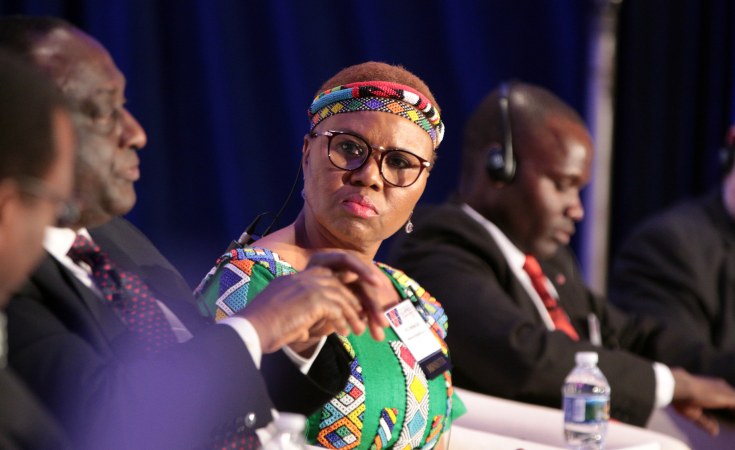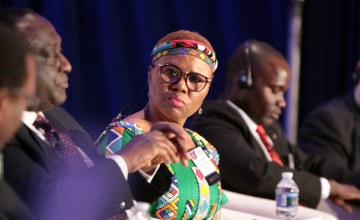Flagging data showing the steep fall in trade between Africa and the United States of America, AfDB President Akinwumi Adesina called for a reboot and boost of the erstwhile robust economic relations that existed between the two sides.
Adesina, who made the call at a US-Africa business summit organized by the Corporate Council on Africa in Washington D.C. on Wednesday, 14 June 2017, said that while business and economic cooperation between Africa and Asian countries were on the rise, the continent's transactions with the United States have nose-dived.
Africa's exports to the US fell from an all-time high of US$113 billion in 2008 to US$26.5 billion in 2015. The continent's exports from January to April this year have only reached US $10 billion. Similarly, US exports to Africa have also declined to US$ 22 billion from an all-time high of US$38 billion in 2014.
China has become the largest trading partner for Africa with its exports to China rising to US$67 billion, a 153% increase over those of the USA in the same year. By 2015, China's exports to Africa were US$102 billion, while US exports were US$27 billion, or 26% of that of Chinese exports to Africa.
"We need to reboot and boost U.S.-Africa commerce and investments. And the time is now! I was very happy that US Secretary of Commerce, Wilbur Ross, also mentioned that it was time to engage with Africa," Adesina emphasized.
He added: "We must change the lenses with which we look at Africa, from the traditional development mindset to an investment mindset."
Adesina gave many reasons it would be in the US's interest to re-engage with Africa, especially at a time when African economies are performing well despite the tough global economic environment.
Africa's GDP growth rate, which averaged 2.2% in 2016, is estimated to rise to 3.4% this year, and to 4.3% in 2018 - above the global averages. In 2016, 12 African countries recorded more than 5% while 20 others achieved growth rates ranging from 3 to 5%.
Furthermore, most of the best performing countries are the non-oil or non-commodity dependent economies such as Côte d'Ivoire which grew at 8.2%, Ethiopia at 8%, Tanzania at 7.2%, Senegal at 6.7%, and Rwanda and Kenya at 6%, respectively.
"So we are swimming with our heads above water. Africa is buoyant and robust. The African economies are doing better than the global average. The message is clear: African economies are resilient," Adesina said.
In addition to macroeconomic stability, Africa is witnessing a spate of good governance, rising domestic demand, and increasing regional trade. African countries are also implementing economic reforms, to the point where the continent accounted for 30% of all global improvements in business and regulatory reforms in 2016.
Adesina cited World Bank data which indicates that 34 out of 48 countries in sub Saharan Africa had at least implemented one business regulatory reform in the previous year.
"Foreign direct investment is growing in Africa. From just $2 billion in 1990, it rose to $56.2 billion in 2016, and is expected to rise to $57.5 billion this year. Africa is still the second fastest growing destination in terms of foreign direct investments," he noted.
In Berlin early this week, German Chancellor Angela Merkel launched the G20 Compact with Africa, which will focus on expanding private investments, in the presence of Adesina and nine African Presidents. In addition, China, Japan, South Korea and India have launched initiatives for Africa cumulatively valued at US$ 110 billion in recent months.
"They are looking for a place where investments will be sure to grow," Adesina told the summit noting that the world cannot ignore a continent where household expenditures will rise to US$1.4 trillion in the next three years.
"Think of the continent where business-to-business investments will rise to $3.5 trillion in the next eight years. Think of the continent where the population by 2050 will be the same as India and China together today. Think of the continent that will brim with huge demand from a rising youth population that will reach 840 million by 2050, all buying and owning consumer products," he said.
There has to be a close partnership between the US, the most powerful nation in the world, and Africa, the next investment growth frontier in the world, Adesina said.
Adesina and President Filipe Nyusi of Mozambique later engaged the audience in a question and answer session. There was a panel session with African ministers on the promotion of small and medium sized businesses, the African Growth and Opportunity Act (AGOA), and business and regulatory issues.
The forum was attended by some 700 participants including Secretary of Commerce, Wilbur Ross who gave the opening speech; the President and CEO of the Corporate Council on Africa Florizelle Liser; and the Chairman, Jeffrey Sturchio.



